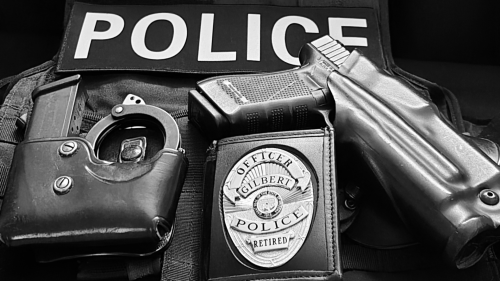Editor’s note: This essay is part of “Stories from the Street,” a Police1 series featuring first-person reflections from officers across the country. These essays are about the lived experiences and moments that changed how officers think, lead and serve. If you have a story to share, we’d love to hear from you. Submit your story here.
I served with the Vancouver Police Department for 29 years before retiring in January 2022. The last 14 years were at the commander rank, but no matter what my assignment was, relationships mattered to me and I was intentional about building positive ones.
As a commander for the Administration division, I sat on the Oral Interview Panel and came to know the stories of the officers we recruited and hired. As a commander for the patrol division at East and West precincts, I got to know the officers assigned to patrol.
I located my patrol office at West precinct where my window looked out at the patrol car parking lot. Officers could see I was in my office when they entered the precinct. My door was located on the main hallway back to the report writing room and across the hall from the briefing room. I took the opportunity to talk with officers throughout the day.
I showed up at the briefing table. I answered officers’ questions and took their concerns and challenges to command staff meetings. I showed up in my office every day during COVID just like they had to. I shared their frustrations during the George Floyd protests and talked about my experience as a San Bernardino County Sheriff’s deputy during the Rodney King riots in Los Angeles. I cared about them as individuals and worked to establish strong relationships.
The shock of retirement
Then I retired.
One of the realities facing law enforcement personnel when they retire is not just the lack of action and excitement in their lives but the loss of family or fellowship they have enjoyed for their entire career as a member of a large but exclusive law enforcement family. One day you are an accepted member of that closed society and the day after you retire, you need someone to let you in through the secure door of the police precinct. It can be offsetting for officers who have enjoyed a degree of status as a member of SWAT, the Drug Unit, a specialty assignment or command staff. There can be a real feeling of loss when retirement occurs. I have felt it.
I encouraged the current chief of police to disseminate information to retirees that would help keep them connected to the department. I requested that department email announcements on recent promotions, transfers and retirements be shared with us. I requested that the department inform retirees when a promotion or retirement ceremony occurs. I suggested they create a Facebook page for retirees with the same information, along with pictures of activities and events the department was sponsoring.
Seeing my relational legacy
One such event I recently attended was the dedication of the training room at the Vancouver Regional Basic Law Enforcement Academy in honor of fallen Vancouver Police Officer Don Sahota. I served with Don Sahota for 10 years before I retired and wanted to be part of this dedication event.
When I arrived, I saw officers I knew. They smiled, reached out their hands and extended greetings. They asked how I was doing, and for a moment, I felt like I was back in the family again.
Later, I realized this was an example of relational legacy. The relationships I had established with each individual were on display. Even three years after I retired, they still acknowledged and valued the relationship we had when I was a member of the department. This response was not rank related; I was no longer a commander who organizationally deserved respect. This was relational. It was human. It was grounded in mutual respect.
The converse is also true. Toxic leadership leaves its own legacy. It is apparent when a toxic former officer is out in public but is not acknowledged or greeted by department members who were subjected to that toxicity. Those relationships carry forward too, just in a different way.
A good leader will develop a legacy of leadership when they retire. They will encourage, correct, challenge and promote the next generation of leaders. They will surround themselves with leaders who have greater skills and abilities than their own. They put the needs of the department above their own. They leave the department stronger than when they found it.
We will all leave a legacy behind when we leave. If we rely on rank, detective assignments, SWAT membership, major cases solved, traffic citations issued, union contracts signed or patrol success, the impact is minor and fleeting. All those accomplishments are forgotten shortly after we retire. What lasts is the relationships we have developed along the way. What people remember is how we interacted with them and how we treated them. Did we care about them? Were they important as human beings? Did we show them respect no matter what their rank or assignment?
We don’t get to choose whether we leave a legacy, only what kind of legacy we leave. Are we known as a strong link in the law enforcement family chain, or as someone whose departure brought relief instead of respect?
We have a choice, not whether we leave a relational legacy behind but what type of legacy it is. Choose wisely the leadership legacy you leave behind.








